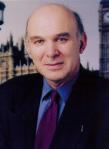Community web sites debated in parliament
Vince Cable MP calls for level playing field for on-line media
| Related Links | |
Full text of the debate from Hansard Cllr. Tony Arbour branded 'purveyor of porkies' Council Tax revenue being used for 'propaganda' Strong Growth for Local Web Sites "The Londoner" blasted as propaganda Sign up for a free e-mail newsletter in your area BrentfordTW8.com
|
The role of Community web sites has been debated in parliament during an Adjournment debate initiated by Dr. Vincent Cable. The Liberal Democrat MP said that he secured the debate not only to tell the relevant Minister about the 'pioneering work' in this field , but also to make the point that such community websites are under serious threat due to "acts of omission and commission by local and central Government". The MP contributes regular articles to his local site in the Twickenham area.
Dr. Cable described the usage and spread of community web sites as remarkable and said they could play an important role in developing e-government, "Parts of the population are poorly covered. Only one in 10 people of pensionable age use the internet for government or other purposes, and only one in six poor families use it. One of the reasons for the importance of community websites is that they reach those groups, particularly elderly people, more effectively than some other means of communication. "
He raised the question of how the development of community web sites could be made sustainable, saying that without state funding, advertising was the only option for community web sites. However Dr. Cable pointed out that the biggest spender on local based advertising, the local authorities had generally tended not to use their local sites. He said, "A key part of the market is premium-cost public advertisements, such as local councils advertising jobs and the more important planning applications. At present, in almost all areas, including mine, local councils make use of the print media, which is often not the most efficient and sensible way to advertise."
He referred to a report commissioned by the Deputy Prime Minister and written by Ove Arup which concluded that the traditional print media was an inefficient way of advertising planning applications and that large numbers of residents were expressing their frustration at hearing about development plans too late to make objections.
Dr. Cable called upon central government to ensure that local councils treated all media equally saying, "There should not be special protection for community websites. That would be unhealthy and is not what they seek. They simply want to be treated on an equal basis with other media."
The issue of best value was raised and the Government was asked to when assessing local authorities to determine whether they were seeking and obtaining best value in their advertising or wasting tax payers money by inefficient use of promotional budgets.
A second problem for community web sites was raised by Dr. Cable, namely the increasing tendency of local authorities to seek to create their own community web sites. He said, "They are developed in-house by IT departments of local councils and they are in competition with genuine voluntary community websites. I cannot speak for all of those, but certainly the perception that I have from people in the field is that often the products of local government are not of good quality, and even if they are of good quality they have an official flavour to them. They quickly acquire a vested interest."
He warned about a protectionist flavour developing and councillors becoming nervous of community web site because they no longer control the news media, as they used to be able to. The community websites are then seen as a problem by the local councils, which in turn promote their own system in competition with them using Government funding.
The MP, who represents a constituency which is within the London Borough of Richmond, was speaking following accusations in Private Eye that the leader of Richmond Council, Tony Arbour, was aware of an attempt by his senior press officer, Alex Aiken to discourage participation by volunteers in local community web sites in the borough. Cllr. Arbour was accused of being a 'purveyor of porkies' by Private Eye but refused to respond to questions on the issue in a full Council meeting.
Yvette Cooper, the Parliamentary Under-Secretary of State, Office of the Deputy Prime Minister, said she was aware of the work being done by independent community web sites and the powerful role they played in supporting local groups, providing opportunities for community action and encouraging participation in the democratic process. She said that the Government was already providing support and resources to make it possible for more councils to support community groups. She promised to raise the issue of advertising revenue with the Under-Secretary of State, Office of the Deputy Prime Minister, Phil Hope, who works in that area and said that local authorities must seek to get maximum value from their advertising budget.
Neighbour Net, the publisher of this web site receives no funding from the public sector. It is supported by advertising of which less than 2% currently comes from the public sector.
March 25, 2005
 Vincent Cable MP - speaking in parliament -
Vincent Cable MP - speaking in parliament -